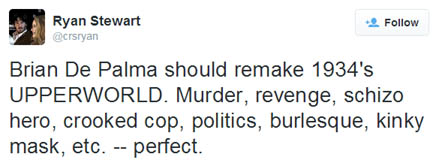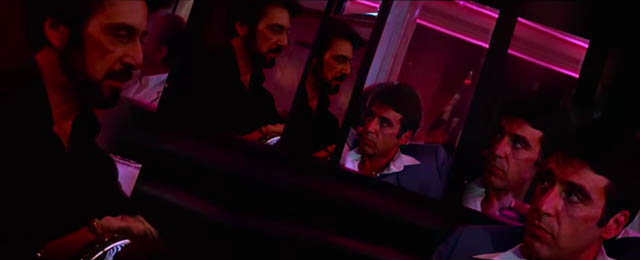'DE PALMA' REVIEWS: 'A BLAST', 'DELIGHTFUL'
"THE FASTEST, FUNNIEST & MOST EXHILARATING HOUR & FORTY-SEVEN MINUTES OF THIS YEAR'S VENICE"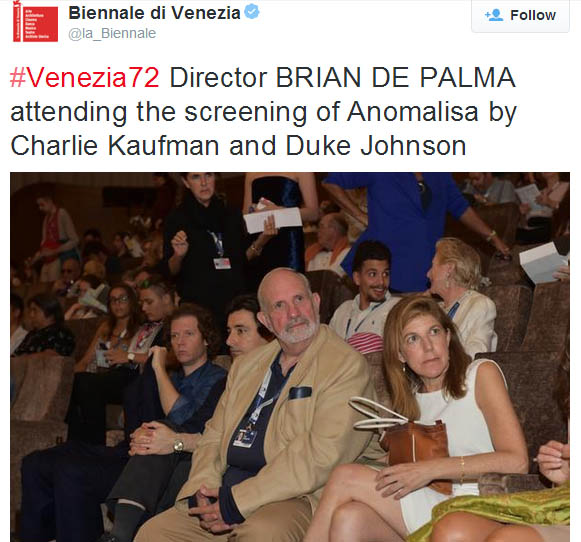
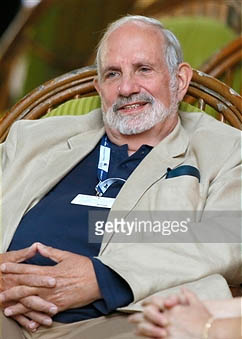 Brian De Palma
Brian De Palma arrived at the Venice Film Festival yesterday and attended a
cocktail party held for the jury and fellow director
Jonathan Demme, who earlier had received the Persol Tribute to Visionary Talent Award. As the
tweeted pic above shows, De Palma,
Susan Lehman,
Noah Baumbach, and
Jake Paltrow also attended a screening of
Charlie Kaufman and
Duke Johnson's stop-motion film
Anomalisa. Later today, De Palma will be honored with the festival’s
Jaeger-LeCoultre Glory to the Filmmaker Award. That ceremony will be followed by the world premiere of the documentary
De Palma, which is directed by Baumbach and Paltrow. A press screening has already happened, and late last night, the reviews began posting to the web-- and they are highly positive. The film was presented without credits, and, according to
The Hollywood Reporter's David Rooney, it "has the feel of a rushed edit, with jittery cuts in the interview segments and uneven audio." One imagines the film will be even more complete by the time it makes its North American premiere at the end of this month at the New York Film Festival. Even so, Rooney adds that "the bid to be comprehensive and cover every last movie (right down to the video for
Bruce Springsteen's 'Dancing in the Dark,' in which the Boss plucks a then-unknown
Courtney Cox out of the audience) makes it feel hurried at times, hurtling over career highlights to touch on minor entries possibly best forgotten. But there's a ton of great material here and
a nonstop flow of expertly chosen clips. With further finessing to allow more time to breathe and savor some of the many virtuoso set-pieces that are a De Palma trademark,
this could be a definitive study of the director's work."
Here are more review links:

Guy Lodge, Variety
"Acolytes of Brian De Palma’s flavorful, flamboyant filmography hardly need reminding of his acrobatic ability as a visual storyteller; what they’ll learn from De Palma is that in front of the camera, he’s a pretty marvelous raconteur too. The septuagenarian director provides an exhaustive but exuberant film-by-film account of a career spanning nearly half a century in Noah Baumbach and Jake Paltrow’s delicious documentary portrait — skimping neither on candid self-effacement or irreverent wit as he recalls such professional triumphs as Carrie, such dispiriting misfires as Mission to Mars, and the wealth of knowledge gained and opportunities lost in between. Elegantly linear in its setup, and reflecting at least one of its name helmers in its overriding mood of buoyant good humor, De Palma reps several Christmases come at once for fans, though it’s playful and perspicacious enough to engage all film-biz aficionados...
"The documentary duly begins with a seductive flurry of excerpts from Vertigo, the narrative of which is described by De Palma as a neat allegory for what filmmakers do: creating romantic illusions only to destroy them soon after. Hitchcock may be a standard point of film-studies reference, but De Palma is at polite pains to point out that he means it more than most: 'People call [him] influential,' he says later, 'but I haven’t seen that many people who actually follow his form except for me.'
"If such words sound conceited in print, he doesn’t project any such airs on camera — he’s equally forthcoming on where he believes he’s misstepped and why. It’s De Palma’s chronological, hindsight-advantaged evaluation of his 28 features (omitting 1970’s filmed stage performance Dionysus in ’69) that gives the doc its meat: His upbringing and Quaker education in Newark and Philadelphia, are covered genially at the outset, as are his years on the film program at Sarah Lawrence, where he began a long-term association with Robert De Niro. But such biographical material, including passing references to his three marriages, is kept to a minimum, as the man’s life is mapped more integrally through his movies...
"De Palma is the first to admit that now is no longer his time, having lost his taste for blockbuster cinema on the unhappy shoot of 2000’s expensive flop Mission to Mars — not coincidentally, his last U.S.-shot project. His four features since then, including the striking, ripe-for-reappraisal The Black Dahlia, were made more on his terms, though given the speed with which Baumbach and Paltrow rifle through them, perhaps he’s less willing to step back and survey his newest work.
"The film is hardly starved for detail by this point, having captured and sustained a lively atmosphere of mutual auteur appreciation usually best conveyed in print — in those landmark Hitchcock-Truffaut conversations, for example. We may never hear the younger helmers’ side of the interview, but De Palma addresses them at several points both with points of agreement and good-natured observation of the differences between their work and his. 'You start with character and work your way outwards,' he says, 'while I start with construction and work my way in.' In this particular portrait, both approaches have combined to most rewarding effect.
“De Palma was presented at Venice with no credits, but is otherwise a polished, swift-moving package, bearing intelligent craft even in its well-lit talking-head material."
Jessica Kiang, The Playlist
"One of the many touchpoints mentioned in the course of De Palma, the new film from Noah Baumbach and Jake Paltrow, is Jean-Luc Godard's Weekend, but if they'd gone for the embellishment of a subtitle in the name of their interview-based doc, it could very well have been 'Brian De Palma: Breathless.' Because it is both literally and metaphorically so, a whistle-stop guided tour of De Palma's filmography in which the legendary director talks non-stop, with one anecdote jump-cut against the next so fast that often the breaths in between sentences are snipped out. The effect is almost disconcertingly rapid-fire at first, and initially it suggests Baumbach and Paltrow are going for something avant-garde. Then you think maybe it's an attempt to mimic the giddy headrush pleasures of De Palma's own high-octane style. And then, maybe four minutes in, you realize it's actually just because he has so damn much to say and all of it is utterly delicious -- in the time saved by removing those pesky inhalations, we probably get six or seven more pithy observations stuffed into this breakneck movie. So you settle in and try to hang on for dear life, like Tom Cruise atop that speeding train, as the fastest, funniest and most exhilarating hour and forty-seven minutes of this year's Venice whips by.
"Formally the film is nothing to write home about — while it's liberally interspersed with clips that seem precisely chosen to make you immediately pang to watch the film in question again in its entirety, all of the De Palma footage seems to have been taken from one long interview, with him facing the camera against the same unfussy background. And despite the names behind the camera, there's never a peep out of anyone else, with the occasions on which De Palma addresses a comment or an aside to 'you guys' meaning Paltrow and Baumbach, coming few and far between. But the two directors, who have known De Palma for ten years now, perform a much more valuable service by removing themselves than any onscreen interlocutors could — they make it feel like De Palma, talking to them as unguardedly and frankly as you would to friends of many years, is talking directly to us.
"Despite the astonishing length and breadth of the De Palma oeuvre, De Palma begins and ends with Vertigo, while clips of North by Northwest, Psycho, Strangers on a Train and others recur throughout. As clearsighted about this as everything else, De Palma does not just acknowledge the Hitchcock influence on his work, he embraces it and even, by the film's close, lays claim to owning it, suggesting that for all the talk of Hitchcock's influence it was really only him who took the responsibility for keeping that legacy alive by devouring it whole and transmuting it into something new.
"Really it's just a delight to spend this time in De Palma's company, because for someone who describes directing as 'creating romantic illusions,' he has refreshingly few about his own eclectic, eccentric and highly individual body of work. There are films he feels are better than their receptions suggest: 'I still think Bonfire of the Vanities is fine, it's a good film. Just don't read the book,' he suggests...
"Directors, he opines more than once, make their best work in their 30s 40s and 50s, tacitly acknowledging that his own output this century has not been his finest. But the bright-eyed, genial, sharp-as-a-tack filmmaker who takes us through his life's work so far in De Palma (endearingly peppering his commentary with exclamations of 'Holy Mackerel!') sure seems like one who could buck that trend and turn in at least one more late-career high. It's something that even De Palma apostates might be persuaded to hope for after watching Baumbach and Paltrow's giddy blast of a doc."
Demetrios Matheou, Thompson On Hollywood
"De Palma has been one of the densest and most exhausting two hours spent in Venice, in the best way possible. Whether one likes the American’s films or not, time spent with him is akin to attending a filmmaking masterclass whose every minute demands notation.
"And the film is, literally, focused on him: it doesn’t involve the views of colleagues or friends, narration of any kind, or the presence of Baumbach and Paltrow, other than when De Palma acknowledges their shared profession himself. The camera is fixed on the septuagenarian as he sits and reflects on his career, film by film, touching on his filmmaking process, the parallels between his life and movies, people he’s worked with, successes, failures, controversies...
"He’s a rum interviewee, frank, funny, not afraid to seem arrogant, as when he recounts the pleasure he’s had watching the Carrie sequel and remake, 'seeing other people make all the mistakes you avoided'. He can get away with such moments, because he’s equally forthright about the failures, whether ones that stank because of his own misjudgement (Bonfire of the Vanities) or the more painful sort, like Carlito’s Way, of which he’s very proud. And the way he speaks about writers, production designers and in particular composers suggests a true collaborator.
"There’s a film buff’s delight to be had in hearing his stories about Pacino’s novel way of escaping a demanding night shoot on Carlito’s Way, or Cliff Robertson’s shameless attempts to sabotage his more talented co-star Genevieve Bujold on Obsession, or Sean Penn’s more productive shenanigans to coax a performance out of Michael J Fox on Casualties ('Good old Sean, he’s exciting to work with'). But the greatest value is in listening to what makes the man tick as a director, whether personal history (Keith Gordon’s pursuit of his mother’s killer in Dressed to Kill was inspired by the young De Palma’s shadowing of his adulterous father) or the shooting strategies and technical approaches to his films, always with the aim of making his scenarios play out in new and exciting ways, and which make his style so singular."
David Rooney, The Hollywood Reporter
"Like the recent By Sidney Lumet, which premiered this year in Cannes, the strength of De Palma is that its sole point of view belongs to the subject. It also helps that he's very good company. It's clear at times that he's in conversation with fellow filmmakers, acknowledging that they will have had similar experiences, but Baumbach and Paltrow remain unseen and unheard. De Palma ventures at one point that their movies start with character and work outwards while his do the opposite, but he seems to regard his work as no less personal.
"De Palma is candid about his failures, honest about his disappointments, and doesn't bother with false modesty where his great pictures are concerned. Speaking of the various remakes and subsequent adaptations of Carrie, the film that put him on the commercial map, he chuckles over the amusement of watching other people make mistakes that he avoided. He's sanguine about movies that were attacked upon their original release and then embraced years later, by which time the initial criticism — usually pertaining to his penchant for baroque violence, especially when perpetrated against women — has been forgotten or become irrelevant...
"While the overarching view of De Palma's body of work offered here could be more cohesive, the wealth of detail is compelling stuff. 'Being a director is being a watcher,' he says at one point, and he comes across as attentive to every aspect of the filmmaking process. That explains how something as seemingly routine as sound recording becomes a central plot point in Blow Out. (For those of us who adored that 1981 release from the start, it still hurts to hear of the studio's appalled reaction to it, in particular the fabulously operatic ending with its cynical sting.)
"His love of drawing attention to the director's tricks, and weaving that film craft into the very fabric of the plot is something De Palma acknowledges came directly from Hitchcock, citing Vertigo as a formative influence. (Hitchcock clips are sprinkled throughout.) Without self-aggrandizement, he even lays sole claim to keeping the Hitchcock legacy alive through artistic renewal...
"Hearing De Palma's version of conflicts with screenwriter Robert Towne on Mission: Impossible, and the crafty way he got Tom Cruise on board with his concept for the exhilarating train-top ending makes the director seem the smartest guy in the room. But he's wistful about how rarely in any career all the elements fall into place as they did on that hit and just a small handful of others. He's forthright about the mistakes he made on one of his most clamorous flops, The Bonfire of the Vanities, and seems downright saddened when admitting he was out of his depth on the big-budget, effects-driven Mission to Mars, which killed his appetite to work in Hollywood.
"As someone who has choreographed too many brilliant and memorably complex action sequences to mention — think the Odessa Steps homage from The Untouchables, for example, or the prom scene in Carrie — De Palma has earned the right to sniff at the clichés of so many previsualized Hollywood action scenes today.
"The personal insights are fairly basic in terms of his upbringing and perhaps a shade guarded concerning his marriages and relationships. But this is unapologetically a professional reflection and not a memoir. While De Palma doesn't appear to go in for much talk of thematic threads in his work, he does come close to geeking out when discussing some of his signature devices, like slow-motion, split screen, long takes, complicated tracking shots and that dizzying 360-degree pan around the editing room in Blow Out. That's the stuff that will make this exhaustive survey catnip to the De Palma faithful."
 Here are some more links to reviews and articles centered around De Palma:
Here are some more links to reviews and articles centered around De Palma:
















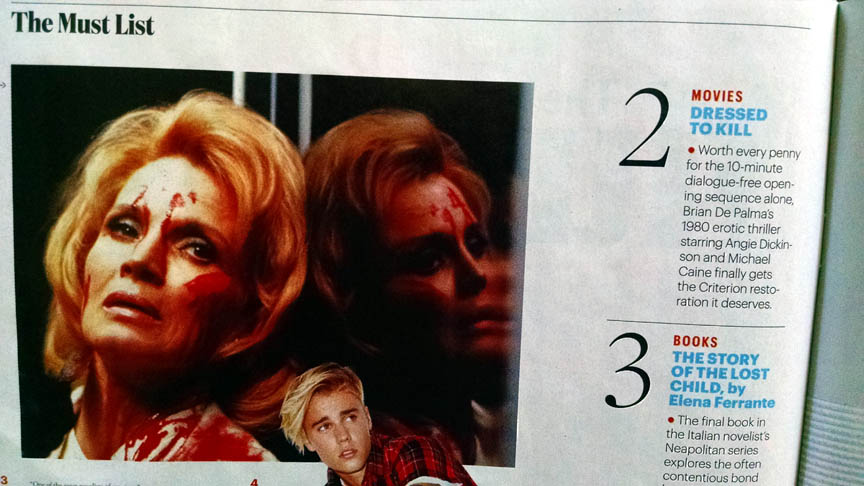
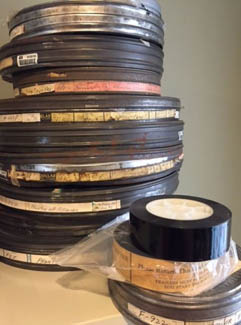 This past July,
This past July, 